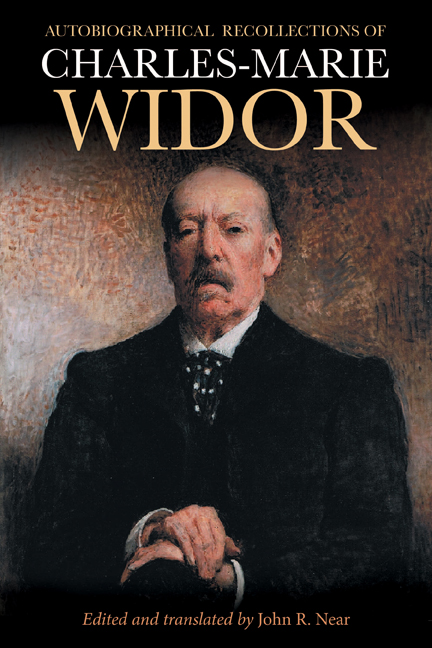Book contents
- Frontmatter
- Contents
- List of Illustrations
- Foreword
- Preface
- Acknowledgments
- Introduction: Tribute to Charles-Marie Widor
- Part One Studies, Early Performances, and Aristide Cavaillé-Coll (1844–69)
- Part Two La Belle Époque: The Franco-Prussian War to The Great War (1870–1914)
- Part Three The Great War and Important Initiatives (1914–37)
- Appendix 1 Birth record of Charles-Marie Widor, 1844
- Appendix 2 Widor’s Diplôme de Bachelier ès Lettres, 1863
- Appendix 3 Widor’s letter of appreciation to Jacques Lemmens, 1863
- Appendix 4 Brussels Ducal Palace organ specification, 1861
- Appendix 5 Widor’s certificate for Chevalier de l’Ordre du Christ, 1866
- Appendix 6 “To Budapest,” 1893
- Appendix 7 Widor’s travels to Russia and his 1903 passport
- Appendix 8 Widor’s list of his works in 1894
- Appendix 9 The Paris Conservatory organs, 1872
- Appendix 10 Chronique [Widor’s appeal for an organ hall at the Paris Conservatory, 1895]
- Appendix 11 Widor’s certificate for the Académie Royale, Brussels, 1908
- Appendix 12 “Debussy & Rodin,” 1927
- Appendix 13 The American Conservatory organ, Fontainebleau, 1925
- Appendix 14 Letters concerning the Trocadéro organ restoration, 1926
- Notes
- Bibliography
- Index
- Eastman Studies in Music
Appendix 12 - “Debussy & Rodin,” 1927
Published online by Cambridge University Press: 09 May 2024
- Frontmatter
- Contents
- List of Illustrations
- Foreword
- Preface
- Acknowledgments
- Introduction: Tribute to Charles-Marie Widor
- Part One Studies, Early Performances, and Aristide Cavaillé-Coll (1844–69)
- Part Two La Belle Époque: The Franco-Prussian War to The Great War (1870–1914)
- Part Three The Great War and Important Initiatives (1914–37)
- Appendix 1 Birth record of Charles-Marie Widor, 1844
- Appendix 2 Widor’s Diplôme de Bachelier ès Lettres, 1863
- Appendix 3 Widor’s letter of appreciation to Jacques Lemmens, 1863
- Appendix 4 Brussels Ducal Palace organ specification, 1861
- Appendix 5 Widor’s certificate for Chevalier de l’Ordre du Christ, 1866
- Appendix 6 “To Budapest,” 1893
- Appendix 7 Widor’s travels to Russia and his 1903 passport
- Appendix 8 Widor’s list of his works in 1894
- Appendix 9 The Paris Conservatory organs, 1872
- Appendix 10 Chronique [Widor’s appeal for an organ hall at the Paris Conservatory, 1895]
- Appendix 11 Widor’s certificate for the Académie Royale, Brussels, 1908
- Appendix 12 “Debussy & Rodin,” 1927
- Appendix 13 The American Conservatory organ, Fontainebleau, 1925
- Appendix 14 Letters concerning the Trocadéro organ restoration, 1926
- Notes
- Bibliography
- Index
- Eastman Studies in Music
Summary
Since the decree of the first consul that in 1803 reorganized the Academy, eight Permanent Secretaries have succeeded one another: Joachim Lebreton [1760–1819], Quatremère de Quincy [1755–1849], Raoul-Rochette [1789–1854], Fromental Halévy [1799–1862], Count Henri Delaborde [1811–99], Gustave Larroumet [1852–1903], and Henry Roujon [b. 1853], who died in 1914.
The eminent architect of the Château de Chantilly, Honoré Daumet [1826–1911], had only deputized for Roujon during his long illness: “Gentlemen,” he told us in session, “I was replacing a patient, but my task is over; it is up to you to provide for his succession.” With that, without prior agreement, somewhat at random, and with a show of hands, my colleagues assigned to me the said succession. It was July 18, 1914; I would certainly have declined the great honor had I been able to foresee the threat of the hour, and the burdens and responsibilities it was about to impose.
At the Institute, the Music Composition Section has six members, who were then: Camille Saint-Saëns, elected in 1881, Émile Paladilhe (1891), Théodore Dubois (1894), Gabriel Fauré (1909), Widor (1910), and Gustave Charpentier (1912, succeeding Massenet). Appointed permanent secretary, I left the section where my chair became vacant.1 On July 23, I received this kind card:
It was upon returning from London that I learned of your appointment; although expected, it is still very fortunate for the entire music world. Please count me among those whom the news particularly delights, and believe in my affectionate devotion.
Signed: Claude DebussyTo which I replied:
Very touched by your precious fellowship, I would be flattered to act as your sponsor to the Academy and to have you as my successor—with the dispensing of my eulogy; you will be welcomed with open arms. Come and see me tomorrow, if possible.
Alas, tomorrow was the mobilization, the war. In the arts as well as in politics, in the Chambers and at the Hôtel-de-Ville, life came to a standstill: no more candidatures, no more elections. Paris became depopulated. Almost the whole of 1915, Debussy spent at Pourville. In 1916, the first attacks of the illness occurred which were to prevail. In a letter of July 3, after being interested in Francis Planté's [1839–1934] concert, he speaks of his sufferings and desire to be healed.
- Type
- Chapter
- Information
- Autobiographical Recollections of Charles-Marie Widor , pp. 177 - 180Publisher: Boydell & BrewerPrint publication year: 2024

